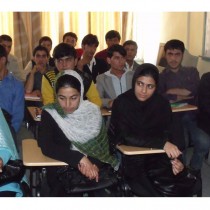
WINNING MINDS, LOSING HEARTS: PERCEPTIONS AT KABUL UNIVERSITY
Forty-two percent of students interviewed do not think that Al Qaeda is finished as a result of Bin Laden’s death
Many students interviewed show alignment with international political and security goals, but resent foreign presence
International community is “winning minds, but losing hearts”
Kabul, 13 May 2011 - Almost 60% of young men interviewed at Kabul University believe that an Arab Spring-style uprising could happen in Afghanistan, according to a report released today by the International Council on Security and Development (ICOS).
There is a significant ‘youth bulge’ in Afghanistan, with 27% of the total population aged between 15 and 29. “Kabul University has a long history of being at the forefront of change - both good and bad - in Afghanistan,” said Norine MacDonald QC, President and Lead Field Researcher of ICOS. “The views of its students may offer a glimpse into the future of Afghan politics.”
The report, drawn from interviews with 125 male students, concludes that in spite of their large numbers, the younger generation is underutilised by the international community in the effort to build a stable and peaceful Afghanistan.
“The younger generation is the obvious place to look for future leaders and this group needs to be supported so that it becomes an active and positive player in the future of Afghanistan,” said MacDonald. “Just 17% of the population is over 40 years of age - in a few years the younger generation will make up an overwhelming proportion of the adults in Afghanistan.”
Forty-two percent of students interviewed think they are not sufficiently involved in peace negotiations.
Fifty-eight percent of interviewees believe Bin Laden’s death is good news
Though 58% of respondents believe that Bin Laden’s death is good news, 36% see his death as ‘bad news’.
Of the students interviewed, opinions on the impact of Bin Laden’s death on Al Qaeda are evenly split: 39% of respondents think it is finished because its founder is dead and 42% think that it is not.
“Although 51% of Kabul University students interviewed think that Bin Laden’s death will hurt the Taliban, 28% think that it will have no effect on the group’s future,” said MacDonald. The remainder had no answer or no comment, with only 4% saying that it would help the Taliban.
Good news - students show alignment with international goals
Over 85% of interviewees believe that voting is important or somewhat important, suggesting a strong commitment to the principle of democracy.
“A majority of 94% of respondents supports girls’ education, 78% support women voting and 79% approve of women gaining a degree. It is important to encourage these young Afghans to play a leading role in supporting the key issues that will define the future of their country,” said Jorrit Kamminga, Director of Policy Research for ICOS.
Sixty-one percent of Kabul University students interviewed support the military campaign against the insurgency and just 6% think that working with the Taliban is right, while 74% believe that it is wrong.
Building political support: ‘Why we are here’
Of concern, half of Kabul University students interviewed did not recognise a description of 9/11 that was read to them, or had no answer. This reinforces previous ICOS research revealing that few Afghans interviewed were apprised of the reasons for the international military presence in their country.
“The fact that this trend also occurs among educated young people shows that there are serious shortcomings in the international community’s explanation of the reasons for its presence in Afghanistan,” said Kamminga.
Winning minds, but not hearts
Despite the apparent intellectual alignment with many of the international community’s objectives, Kabul University students interviewed were not entirely approving of the international presence. Fifty percent of respondents think the international forces disrespect their religion and traditions and 42% say their opinion of foreign forces has become more negative over the past year. Sixty-eight percent of respondents think it is a good thing that foreign forces are starting the transition process of handing over security responsibilities to the Afghan security forces from July onwards.
Should I stay or should I go?
Although forty-four percent of those interviewed said that they would leave Afghanistan given the chance, 52% expressed an active interest in staying to help their country. Fifty-eight percent of respondents said they feel either angry or sad most strongly on a regular basis, implying strong dissatisfaction with their current situation.
A science student, aged 28 is noted in the report as saying, “I love my homeland and my countrymen. I want to work hard to remove those people that make Afghanistan insecure.”
“Empowering and supporting the new generation will bring dividends in the transition process as they stay to develop the country’s human capital,” said Kamminga.
The research was a pilot project inside of ICOS’s larger study of young men in Afghanistan. It is hoped that this research will be expanded to other universities in Afghanistan and both male and female students in the future.
The full report can be found at: http://www.icosgroup.net/2011/report/kabul-university/
Leave a comment
| Copyright © 2009 - 2024 Sunatimes News Agency All Rights Reserved. |
| Home | About Us | Diinta | Reports | Latest News | Featured Items | Articles | Suna Radio | Suna TV | Contact Us |
 0
0 









WINNING MINDS, LOSING HEARTS: PERCEPTIONS AT KABUL UNIVERSITY
For immediate release Almost 60% of male Kabul University students interviewed believe that an “Afghan Spring” could take place